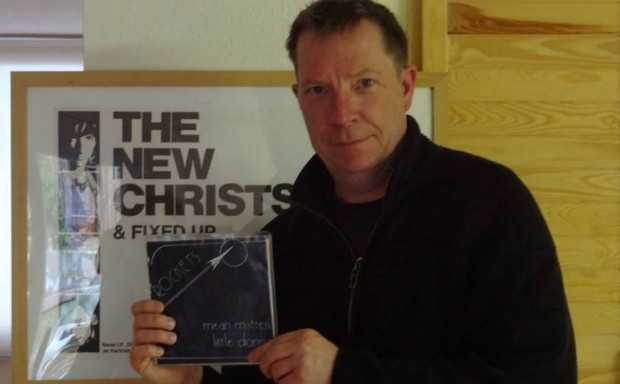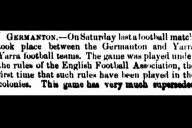Shoot Farken Q&A: German football writer Uli Hesse.
I was writing a story about the transformation of German football and what Australia could learn from it when I first came across Uli Hesse.
I picked up his extraordinary book, Tor! The Story of German Football, to do a little research and got in touch with him for an interview. Uli also writes a regular Bundesliga column for ESPN and has written a book about his beloved Borussia Dortmund.
In the course of the interview we touched on St Pauli, the iconic German rebel football club, and I mentioned I was a fan of punk band Turbonegro, who of course are St Pauli fans.
This soon cascaded into a long discussion about Australian underground rock, something Uli knows a heck of a lot about. But Uli is one of those people who knows about all sorts of cool shit, from punk rock to baseball – which he wrote his Masters thesis about.
So we here at Shoot Farken thought it would be worthwhile to find out a little more about his many passions.
His new book, Who Invented the Stepover?, was co-written with Paul Simpson.
SF: Most people know you for the books you’ve written, like Tor! The Story of German Football, and your Bundesliga column for ESPN FC. But you’ve also got a deep love and knowledge of underground rock music. I was astounded by how much you know about Australian bands from the ‘80s and ‘90s – a real golden age for Oz underground rock. What are some of your favourite Oz bands and how did you hear about them?
UH: There are literally too many bands to mention. Back then, I made a compilation tape for my girlfriend, who is now my wife, that I dubbed “Wizards of Oz”. It was a 90-minute tape, and it had by and large only one song per band, all stuff taken from singles I had lying around the house.
There were really obscure things on that tape, from the Assassins (a side project of the Dagoes, though that won’t mean a whole lot more to someone reading this) to one-record wonders like the Melting Skyscrapers. But my wife loved these rarities just as much as, say, a Radio Birdman or New Christs classic.
Her taste is far, far, far more mainstream and charts-oriented than mine, but to this day she will list widely unknown Australian groups such as the Trilobites and the Mad Turks among her Top 5 or Top 10 bands of all time.
Just the other day, I talked with an English friend of mine, David Knight, about the Australian underground in the mid-80s and we agreed that there hasn’t been anything like it since. You could (and we would) actually order stuff sight unseen – the name of the label, the city or just the producer was often impetus enough – and the record would always turn out to be amazing.
David even did that professionally. He worked at a store in London, Plastic Passion, and then became self-employed and went to record fairs all across Europe.
Funnily enough, the reason I met Dave was that we stayed at a B&B his wife Julia runs in Glastonbury some years ago. As she was showing us our room, my wife glanced around the hallway and told me: “There’s a Radio Birdman poster!” Whereupon Julia quickly turned around and said: “You know Radio Birdman? That’s fantastic! Even most of our Australian guests have never heard of them.”
That’s where I first heard “Slave Girl” by the Lime Spiders, probably one of the two seminal records that introduced the majority of European music fanatics to what was happening down under.
One reason why I got so heavily into that scene was that I could listen to John Peel, the famous English radio DJ. Germany was still technically an occupied country and in my neck of the woods, the Ruhr area in the western part of Germany, there were many British barracks. They had their own radio station, the British Forces Broadcasting Service, and Peel was on once a week, playing cutting edge underground stuff, this being a time when there still was an underground.
That’s where I first heard “Slave Girl” by the Lime Spiders, probably one of the two seminal records that introduced the majority of European music fanatics to what was happening down under.
The other knockout record was “Igloo” by the early incarnation of the Screaming Tribesmen, when Died Pretty’s Ron Peno was in the band. Peel played that too, of course.
I particularly remember the night he played “Driving the Special Dead” by the Lipstick Killers. I got so excited about it that I just had to find this record.
What happened next was that I tracked down Au Go Go Records in Melbourne. It was a label but also a mail-order house. They would send me their latest catalogue, I would place an order, put a bunch of Australian dollars in an envelope (that was the only way I could pay back then), send it away and hope for the best. Never once did the money get lost. Never once did they send me a bad record.
You used to write music pieces for the German Rolling Stone among other outlets. Do you still write about music? Do you find there’s a big difference between writing on music and football?
During that era, the mid-80s to the mid-90s, I was contributing to an English-language German fanzine called H’artbeat!. (Which Dave Knight used to sell at Plastic Passion, as we found out when we became friends more than two decades later. It’s a small world.)
You will be aware of the fact that a certain strand of Australian rock, let’s call it the Radio Birdman family, was heavily influenced by Detroit’s MC5. In early 1995, I did an interview with the MC5’s Wayne Kramer for the fanzine. On the spur of the moment, I sent a revamped version of the piece to Rolling Stone – and they actually printed it.
But a part of me always knew that there was no future in music journalism for someone who enjoyed the Eastern Dark and the Stems more than Nirvana or the Pixies.
That’s how I got into journalism for a living. But a part of me always knew that there was no future in music journalism for someone who enjoyed the Eastern Dark and the Stems more than Nirvana or the Pixies. Perhaps you could say that I gradually moved into football writing because sport is an aspect of modern culture where my preferences are more compatible with the majority’s.
These days, I only write about music-related things for fun. I’ve done two pieces for Sabotage Times, the online magazine. One was about the oldest record store in the world, the other lists 111 songs that mention the Ramones.
For me, writing about music and writing about football is not dramatically different, because I still have what you could call a fanzine attitude. I tend to avoid doing interviews with celebrity players or covering what everyone else covers, simply because that’s not what I myself would want to read.
In your experience as a writer, who are the bigger prima donnas – musicians or footballers?
You would think the answer is easy, because most of the musicians I have interviewed, and there have been many, were people who played in small bands and were doing it for love, not for fame and money, while most of the footballers I have interviewed were pampered millionaires all but trained to be boring.
But the only two interviews I have ever done where you could actually feel the room temperature drop dramatically because I had unwittingly stepped on a toe were music-related. Funnily enough, in one case it was because I said I loved an obscure Australian record. (“Mean Mistress” by the Rockets. The interviewee wrinkled his nose and mumbled something about it being “lowest common denominator rock”.)
In the other case it was because I said something unflattering but totally innocent about David Bowie.
You’re also into country music and US sports like baseball. How did that interest in such quintessential American art forms develop?
That baseball obsession comes from my love of writing. I picked up a few books about baseball and they were so good that I kept buying more and more.
They say there are more books about baseball than about all other sports taken together. I wouldn’t know about that, but what I can say is that the game’s literature is so incredibly good that it’s not even a competition. I learned most of what I know about American social history from baseball books.
I learned most of what I know about American social history from baseball books.
My love of country music has to do with the same interest in popular music that led me to the Oz underground. I know only very few people who were deeply, seriously into rock ‘n’ roll and who did not at one point arrive at one of its sources, which is American roots music. I actually prefer that term, because when you say “country music”, most people think you mean Garth Brooks or Shania Twain or whoever is popular with the Nashville crowd. I prefer old, traditional country music – think Hank Williams Sr. – or the younger bands that have been termed alt country.
Football in Germany is going through a strong period and the world seems to have taken a liking to not just the national team, but also the Bundesliga culture (both on and off the pitch). I know you could write a thesis on why this has happened, but what are the basic reasons?
What happened was that we radically overhauled one element of our football culture, namely the game as played on the pitch, while we vehemently protected another, namely what happens off the pitch. Oh, and we also ran out of money.
Around the turn of the century we realised that we’d missed the bus, that our football was outdated and there were no young talents coming through. So we changed the entire youth set-up and invested heavily into it. A few years later, a financial crisis hit our clubs, forcing them to go with young German players instead of signing ageing stars from abroad.
But at the same time, we also allowed ourselves to think and talk differently about football. This is how and why a lot of innovative, young coaches got into the game who had never been prominent players but who knew what they were doing. This is also how and why our style changed.
What happened was that we radically overhauled one element of our football culture, namely the game as played on the pitch, while we vehemently protected another, namely what happens off the pitch. Oh, and we also ran out of money.
So, that’s one reason why German football has become hip – it’s pleasing to watch and there are many young, skilled players.
But equally important is that whole fan culture thing, from terracing and low ticket prices to clubs owned by members, not by corporations or wealthy individuals. We preserved all this partly because we’re so deeply steeped in the amateur spirit our game was originally built upon.
My book about the history of German football, Tor!, sometimes made fun of that attitude. In the updated version, which should be out on December 1, I somewhat apologise for that – because it’s precisely this conservative, anti-commercial element that now makes German football so attractive.
I’ve just been to England and many, many people over there are deeply disillusioned about their own football, about what the clubs have become. They feel that the English game has taken a wrong turn somewhere and admire Germany for having stayed on the straight and narrow. Of course it’s not as simple as that, but there’s a grain of truth to it.
You’ve got another new book out, Who Invented the Stepover? Can you tell us a little bit about it? Did Pepi Bican invent the stepover?
Pepi Bican does make an appearance in the book, but we traced the stepover to South America and the first decade of the 20th century. That’s all I’m prepared to disclose. But it’s a good example of what the book is about.
I wrote it together with Paul Simpson, who was one of the first editors of FourFourTwo and is now the editor of Champions Matchday. His idea was a football version of Why Can’t Elephants Jump?, which is a book put out by New Scientist magazine collecting answers to science questions readers had sent in.
The difference, of course, is that we thought up the questions ourselves. And that the answers couldn’t and shouldn’t always be black and white, because football isn’t a science. So sometimes the answers are more like very educated guesses.
Take the longest move that led to a goal. As it goes without saying, there may have been a pub team in 1925 that scored a goal after stringing together three hundred passes. So what we did was point towards a few well-known candidates and then suggesting a goal that was scored in a heated, famous derby after 35 consecutive passes. Take it as a challenge.
In still other cases, the story of the search is at least as interesting as the eventual answer. We literally followed the stepover through the decades, always trying to find an earlier mention. You’ll meet some interesting characters along the way if you join us.
So here’s where you give us the dreaded Top 5 list. Let’s stick to the Oz music theme. What are your five all-time favourite Oz rock/punk songs?
Honestly, I can’t do this; there is just too much stuff I wouldn’t want to leave out. So I’m going to do something else. Here are 2×5 songs from the five core years of the ‘80s that define a good deal of what the garage/guitar rock scene was about back then.
1983:
“Igloo” by The Screaming Tribesmen
“My Baby Thinks She’s a Train” by The Triffids
1984:
“Slave Girl” by the Lime Spiders
“Out of the Unknown” by Died Pretty
1985:
“Surfin’ On My Face” by the Hard-Ons
“Make You Mine” by The Stems
1986:
“Walking” by the Eastern Dark
“When I Die” by Happy Hate Me Nots
1987:
“Dropping Like Flies” by The New Christs
“Night of the Many Deaths” by The Trilobites
















